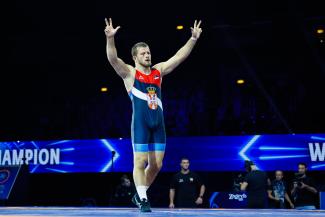UWW mourns death of Bureau member Lucio Caneva
Friday, July 22, 2022 - 07:41 By United World Wrestling Press

CORSIER-SUR-VEVEY, Switzerland (July 22) -- With great sadness, United World Wrestling has learned of the death of Lucio Caneva, a UWW Bureau Member, manager of the Italian national team, and Vice-President of the Mediterranean Committee of Associated Wrestling Styles. He was 61 years old.
Mr. Caneva, who attended the U15 European Championships in Croatia last weekend, dedicated his entire life to wrestling, making significant contributions first as a wrestler, then as a coach, followed by a successful tenure as an administrator.
"Mr. Caneva's passing is a big loss to the UWW family," Nenad LALOVIC, UWW President, said. He was a prominent figure in our sport. His role as a wrestler, coach and administrator was inspiring. My deepest condolences to the Caneva family."
Born on October 16, 1960, Mr. Caneva started as a young wrestler in his birthplace Genoa. He went on to become the trainer of one of Italy’s biggest wrestling clubs, Polisportivo Mandracci and became the president of the Liguria Regional Committee.
Mr. Caneva leaves behind his wife, Edit Dozsa -- a Hungarian international referee, who took part in the 2008 Beijing Olympics – and two children, both a part of the Army military sports group.
He coached his daughter Dalma, 28, who recently won the bronze medal in the 68kg category at the Mediterranean Games and has also finished on the podium at the European Championships in 2020 and 2021. His younger son, Aaron, is an Italian national champion and also competed in the Mediterranean Games.
In 2017, he moved to Rome with his family to assume his duties as the manager of the Italian wrestling team. Mr. Caneva and his family played an important role in welcoming two-time world champion and Rio Olympics bronze medallist Frank Chamizo Marquez to Italy. Mr. Caneva’s confidence in the wrestler's abilities, who also received support from the National Federation, FIJLKAM, became the face of Italian wrestling.
Last year, Mr. Caneva was elected as the Bureau Member of the UWW. His outstanding contributions to wrestling were recognized after he was honored with the Star of Sporting Merit.
The UWW expresses its deepest sympathies to the Caneva family.


Share your thoughts.
Comments